#dynamic analysis
Explore tagged Tumblr posts
Text


Pushing my Jiang Cheng Knows agenda, with some sangcheng cause I love them :)
For some reason I think this suits their characters well. Nie Huaisang knows he isn’t a good person. He planned for people to die, both good and bad people. He knows his hands aren’t clean and that some sins he will never be forgiven for, but he did it all for the sake of the people he loves so he cannot find it in himself to regret any of it. Jiang Cheng knows this too. He knows Nie Huaisang has caused, if not done, terrible things. But he has spent so much of his life in the shadows of others, seeking love and affection from people who could only ever give him pieces because they loved someone else more. So when he finally has someone who loves him whole, someone who would do such terrible things for him, he can’t bring himself to turn away from it.
They do not love each other in spite of what they’ve done. They just love each other.
#sangcheng#character analysis#dynamic analysis#relationship analysis#jiang cheng#canon jiang cheng#jiang cheng knows#nie huaisang#mastermind nie huaisang#i want what they have
113 notes
·
View notes
Text
Small analysis on the “true” names of the characters The Doctor & The Master:
Recently I saw a post about how Theta means death, and I thought why the hell not look up what Koschei means (outside of the villain archetype) and he means deathless. It had me thinking - these names that the fandom seems to have chosen from hints and archetypes are scarily accurate.
Theta; the meaning of death, the hero where we are constantly shown as the hero, is a morally gray character. They are never at the hands of death, they are death’s hands. They never welcome death, and may never die. But they welcome upon the deaths of others even unintentionally. To the point where they murder another child to protect their other half.
Koschei; the deathless, the villain which the hero can never rid of. They have “died” several times, and we are led to believe they’re really dead every time. But like a cancer that our hero can’t get rid of, they come back again and again. They are the hands of the universe, driven with a madness so pure sometimes it can be seen as beautiful.
These two are unable to be without each other, The Doctor, our Theta, cannot exist without the Master, our Koschei. To exist without the deathless brings the universe pure fury and destruction. They are two sides of the same coin, and I wonder if the fandom is even aware of how these names represent their characters so well.
#thoschei#tensimm#twissy#doctor who#theta sigma#koschei#analysis#character analysis#dynamic analysis#I hate tagging anything on any website what do I even tag this as#gay as hell
112 notes
·
View notes
Text
Affection Language
Words of Affirmation
The ones with Words of Affirmation as their favorite affection language to receive from others value sincere compliments, encouragement, and verbal recognition of their worth. They feel most loved when their emotions, achievements, or efforts are acknowledged through kind and thoughtful words.
The ones with Words of Affirmation as their favorite affection language to give to others are natural encouragers who often express their feelings openly. They frequently use heartfelt compliments, thank-you notes, and uplifting messages to make others feel appreciated and supported.
Color Code: Blue
Emotional Connection
The ones with Emotional Connection as their favorite affection language to receive from others cherish deep conversations, empathy, and understanding. They feel most loved when someone takes the time to truly listen, validate their feelings, and share emotional moments with them.
The ones with Emotional Connection as their favorite affection language to give to others are empathetic and attentive. They create safe spaces for others to share their thoughts and feelings, often making an effort to understand and connect on a deeper level.
Color Code: Yellow
Quality Time
The ones with Quality Time as their favorite affection language to receive from others appreciate undivided attention and meaningful interactions. They feel most loved when someone prioritizes spending time with them, whether through shared activities or heartfelt conversations.
The ones with Quality Time as their favorite affection language to give to others make an effort to be fully present and engaged. They enjoy planning meaningful experiences and dedicating their time to show how much they care.
Color Code: Green
Exchanging Gifts
The ones with Exchanging Gifts as their favorite affection language to receive from others treasure thoughtful gestures that reflect their personality and interests. They feel most loved when someone puts effort into choosing or creating something meaningful for them.
The ones with Exchanging Gifts as their favorite affection language to give to others are highly observant and attentive to what others enjoy. They often express their affection by surprising others with tokens of appreciation or heartfelt presents.
Color Code: Indigo
Acts of Service
The ones with Acts of Service as their favorite affection language to receive from others value practical help and thoughtful gestures. They feel most loved when someone goes out of their way to make their life easier or takes care of something important to them.
The ones with Acts of Service as their favorite affection language to give to others are proactive and considerate, often stepping in to help without being asked. They express affection by handling tasks, offering assistance, or solving problems for others.
Color Code: Orange
Physical Touch
The ones with Physical Touch as their favorite affection language to receive from others find comfort and connection through physical closeness. They feel most loved through hugs, hand-holding, or a reassuring pat on the back.
The ones with Physical Touch as their favorite affection language to give to others are affectionate and tactile. They often initiate comforting gestures like a hug or a gentle touch to express their care and warmth.
Color Code: Red
Intellectual Connection
The ones with Intellectual Connection as their favorite affection language to receive from others appreciate stimulating conversations and the exchange of ideas. They feel most loved when someone engages their mind and respects their perspectives.
The ones with Intellectual Connection as their favorite affection language to give to others enjoy sharing knowledge and exploring ideas with others. They show affection by initiating thoughtful discussions and encouraging curiosity.
Color Code: Violet
Now, it's headcanon time~

Please give comments to help me improve~ Have a nice day.
#digimon#digimon adventure#digimon adventure 02#digimon tamers#digimon frontier#digimon savers#digimon xros wars#digimon hunters#digimon universe appli monsters#digimon ghost game#yagami taichi#motomiya daisuke#matsuda Takato#kanbara takuya#daimon masaru#kudou taiki#akashi Tagiru#shinkai haru#amanokawa hiro#crossover#headcanon#imagine#meta#analysis#relationship analysis#character dynamics#dynamic analysis#affection language
11 notes
·
View notes
Text
Why John Didn’t Apologize to Terry (1/2)
I see Terry as being a very black-and-white thinker when it comes to John and I think that’s why John could not apologize to him like he did the others he wronged. Terry, unlike Johnny or Tory, I feel could only either forgive John in full and embrace him again, or continue to hate and seek out revenge against him forever. Johnny and Tory, on the other hand, will never be able to truly forgive John for what he put them through. Even if he was genuinely remorseful, I think they are both at a point where they have acknowledged the sheer amount of damage that he’s done and are (rightfully) done with him. However, I also think that part of them, despite what he did, will always love him and be unable to bring themselves to truly hate him, even if their hatred towards him would be completely justified. I cannot see either of these reactions or feelings being true of Terry. At all. Perhaps this is somewhat biased coming from me considering my insane cobra husbands brain rot but I really feel that if John expressed even a slight bit of sincere remorse for literally destroying Terry’s life that Terry would immediately jump right back into John’s arms and go along with whatever scheme John is currently plotting. And the slightly-less-likely possible outcome I can imagine in a scenario where John would apologize to him would just be that he’d get even more mad at John for taking so long to feel sorry about what he did. And from there he’d continue to seek out revenge against him. I don’t think John could handle either of those reactions. And I think he knows Terry well enough to know that those are the only reactions that he’d possibly have towards a John Kreese apology. I think John knows that if Terry forgave him and wanted to go and act all crazy with him again, he’d also want to do it with Terry too — and in this scenario, we’re imagining that he really is sorry for his actions, and does want to change, even if that doesn’t mean we should forgive him as an audience — and he would. He would go off the rails again, because that really is the nature of his bond with Terry; fighting the world together to prevent any chance of further terror being inflicted upon the other. Now, on the other hand — what if he didn’t, and I mean absolutely did not, forgive John? I don’t think John would take well to that. We see him handle (and even understand) the fact that Johnny and Tory didn’t completely cave to his apologies, but I think it’s imperative to understand that his connection with Terry is different. I know that should seem obvious; Johnny and Tory are like John’s son and granddaughter, whereas Terry is his (ex) best friend and (ex) partner-in-crime. But that’s not the difference-in-dynamic I’m referring to. What I’m really thinking about when I think of WHY I can’t imagine John being okay with Terry not forgiving him is the fact that Terry was the only person he feels he was truly able to save. Terry and John had an unbreakable bond with each other because of what they endured together; being held captive as prisoners of war, watching their close friend get shot in the head and die right infront of them, John choosing to potentially sacrifice his life for Terry. After John made the choice to risk his life for Terry, he almost immediately is met with the news that his girlfriend, Betsy — who he had also saved (from her abusive boyfriend) — had passed away. He was not there. He was overseas and wasn’t even aware that she had passed away for days, possibly weeks. He had no control over what happened to her; he could not have saved her. He was literally saving Terry, on his own volition, as he found this all out. He chose to save him. And he was successful. Terry lived, so did he, and they remained friends for years. John could not have saved Betsy, nor could he have saved his mother from her mental illness, but he could and did save Terry during the war. Terry, to John, is evidence that he is in control of what happens in his life, and that he is able to be a protector. Considering all the loss John had endured so early in his life —
#PART 1!!!! reached text limit#sorry#john kreese#terry silver#krilver#cobra husbands#character analysis#dynamic analysis#cobra kai
10 notes
·
View notes
Text
On Kyle's Side: My Personal Take on Cartman And Kyle's Dynamic From Kyle's Point Of View
This is a four part essay in which i explore Cartman and Kyle's relationship, focusing primarily on Kyle's perspective. As said, i have broken it down into four different parts titled:
Sense of Identity
Martyr Complex and Competitiveness
Cartman
Their Relationship
There will be an extra chapter where i will make some additional commentary.
Hope you guys enjoy.
1. Sense of Identity and Selfishness
In the show Kyle is always concerned about “doing the right thing”, at least that's what he likes to tell himself. Though in reality, he is extremely selfish when push comes to shove and the reason for that stems from his constant questioning of his own identity and his stance in things. This makes him come off as rather inconsistent in a lot of ways. As a result, Kyle feels very lost. So what does he do? He decides to base his opinions and feelings and thoughts off of his environment because his own existance overwhelms him so much (eg. the "Tooth Fairy Tats 2000" episode). This puts him into this vicious cycle where he keeps getting lost even more due to not being able to pinpoint his own frame of thought and latching onto the external world that consists of many different people who have found their own way in life who also keep changing constantly and thus leaving all kinds of contradicting impressions on him. Throughout the series we see him try to change his apparence, religion, even his personality for the sake of fitting in (this also correlates to his martyr complex which i will get to). He creates this moral code for himself that he conditions himself to stick to in order to find his own identity and feel a sense of belonging but the sheer inconsistency of said moral code causes him to come off as indecisive, sometimes as a people pleaser and sometimes a hypocrite.
His defiance of a stable frame of mind pushes him to act on instinct and his momentary emotions while his refusal of self-acceptance causes him to distance his true self from others he considers close to him (Stan), hence the selfishness. It makes sense because how could someone get close to another when he can't even make peace with his own identity?
The reason i am mentioning this is to point out that since Cartman is so extreme in his beliefs and deliberately commits so many evil and selfish deeds, Kyle is obsessively drawn to him because it is so easy to call out and oppose him. Their polarity makes Kyle feel a sense of self he doesnt allow himself to truly make peace with and sugarcoat how fucked up he can be just like all the people in South Park that have wronged him but not enough to channel these feelings into. Cartman keeps Kyle grounded. Just like basically every other kid in the show, Kyle has done terrible things but he is so concerned about being right that he has to have Cartman by his side to make him escape from his own inner conflicts by reflecting it directly onto Cartman, the one person he is actually much more similar to more than he likes to think but he can only subconsciously acknowledge it.
2. Martyr Complex and Competitiveness
Another very essential aspect we need to pay attention to is Kyle's martyr complex. Kyle feels the need to not only to do the right thing but also to “sacrifice himself” for it. He is so self righteous to the point that not only does he not acknowledge his own flaws he also thinks he has to be and is some kind of heroic figure to others (eg. "Ginger Cow"), though this is more subtle compared to the other aspects of his personality.
The martyr complex causes Cartman to be seen as an even easier target than he already is and Cartman is more than willing to exploit Kyle for it hence feeding his very own complexes. They mutually feed off of each other to the point they are obsessed with each other and need each other. I would also like to point out that Kyle often shares some of his most vulnerable moments when Cartman is by his side in a suprising way (eg. choosing to stay by Cartman's side in the "You're Getting Old" and "Ass Burgers" episodes as an escape from Stan's depression at the time, crying with Cartman in "Kenny Dies" etc.) and vice versa. Though this is hard to notice on Cartman's side because Kyle conveys his vulnerability via confusion, sadness and desparation whereas Cartman does so via anger, jealousy and revenge.
3. Cartman
Cartman chastising Kyle like this most likely stems from how he believes Kyle was the catalyst to how fucked up he turned out to be due to his constant agression and bullying towards him in the earlier seasons, where he was mostly just a spoiled brat and nowhere near as bad as he is now. His pent up fury leads Cartman to also feel an extreme amount of envy towards Kyle with the reason of Cartman being a little more capable than Kyle at recognizing how him and Kyle share many similarities (being very emotionally driven, selfishness, neuroticism, stubbornnes, a habit of denying their own mistakes) who is in full denial of it on a conscious level. Cartman does try to get closer to Kyle and also the rest of his friends and seek their validation in the earlier seasons but as time goes by he realizes more and more that Kyle does not get the same treatment as him regardless.
Therefore, Cartman blames Kyle for his suffering and takes it all out on him in various disgusting ways because he thinks that Kyle deserves all the terrbile things happening to him.
It is very important to take into consideration how abhorrent Cartman's upbringing was and how influential it is to the way he feels towards Kyle. All of his childhood; he was raised with all kinds of abuse, neglect, extensive bullying and was depraved of almost all positive emotions. The result of this is Cartman ending up percieving positive emotions in a very traumatized, distorted and disturbing way. With this gradual build-up and "Scott Tennorman Must Die" being his breaking point by spreading fear to all of South Park and feeling an overwhelming amout of attention on him that he craved so much, Cartman ultimately comes to the conclusion that he can only and only validate himself by inflicting negativity on others. Independent from being conventionally "positive" or "negative" emotions, post-Scott Tennorman Cartman correlates all of his emotions to seeking attention and asserting himself as much as he can in means of a defense mechanism and in means of validating his own existance. His real feelings are filtered through a broken perspective, of which are conveyed intensely to the people he feels strongly about like Kyle or Liane.
How this all comes back to Kyle lies in the fact that Cartman also "benefits" from the way Kyle caters to his own problems via their seemingly very polarized relationship, not only does Cartman keep Kyle grounded as mentioned but Kyle does keep Cartman grounded as well.
At this point, their individual vicious cycles have become one, a constant play of cat and mouse; with both of them unable to differentiate which one is which, ever chasing.
4. Their Relationship
Describing their feelings towards each other as solely hate wouldn’t do justice to the times they tried so hard to keep the other in their lives (eg. the "Smug Alert" and "Skank Hunt" episodes) not only for the sake of just existing in each others lives or keeping in touch etc. but also to keep each other in their individual loops they are in, of which they cannot maintain with anyone else.
As a consequence Kyle and Cartman’s mutual obsession with each other leads them to go such lengths as saving each other multiple times. However, since there is a perpetual competitiveness between them due to Cartman's evny towards Kyle and Kyle's insatiable need to prove himself to be better than Cartman, they simply cannot stand each other’s happiness, especially if it involves someone really close to them, like a partner. Cartman ruining Kyle's potential romantic relationship with Nicole in "Cartman Finds Love" and Kyle trying to ruin Cartman's relationship with Heidi in "Doubling Down" and Kyle being unable to appreciate Cartman finally changing his ways for good and having a loving relationship and family in the Post Covid specials are all examples of both of them selfishly trying to involve the other in their own issues they should be able to deal with on their own, only have they not been such self absorbed people.
Their rivalry brings out the best and the worst in each other and they both know deep down that they are just like each other and they both hate it and feel an odd sense of comfort in it. That is exactly the reason why they simply cannot stand when the one of them goes on to have a happier life than the other. Not only do they feel as if they have lost some kind of battle but they also feel abandoned when it happens.
Extra Thoughts:
I find their relationship to be extremely complex and honest to god it has my multi media overthinker ass climbing up the walls and shitting furnitures. They are my favorite characters in the show and analyzing both of them was such treat to me. Due to some things i have mentioned in this essay especially on the last chapter, you can interpret some of them in the same vein as some kind of shipping subtext, even though this essay is essentially written in means of sheerly exploring this dynamic as it is. I honestly like keeping things really ambigious without necessarily categorizing relationships as romantic or platonic but if written properly i can enjoy both renditions of this relationship.
In order to clarify some things, i can enjoy romantic kyman ONLY AND ONLY in the condition of Cartman bettering himself over the years. I know it would be really difficult and may seem impossible to most of you but i find it an interesting and challenging story to think about and create content for. I believe that Eric is forever gonna stay as an asshole and i do not expect him to become an angel in the future. However I also think of him to be a really traumatized 8 year old, who is a really fucked up product of his really fucked up environment, a child who is smart enough to learn to be a better person, especially to those he values as his friends if given the proper opportunity. I do not think that their relationship will ever be a conventionally and classically an ideal one, especially from an outsider's perspective but Kyle and Cartman (and the entirety of South Park's cast) are both very far from being ideal human beings in the first place. At the end of the day, relationships can be very complex and unhealthy in real life, they always come in different colors and shapes. It is okay to explore a relationship in fiction without thinking it is the ideal relationship or the relationship you want to have in your own lives. It is okay to explore a relationship because it is interesting and well-written. This is what media literacy is all about.
As a disclaimer before some dumbass ship discourse happens, there are ofc some lines not to cross like the romanticization of inc*st, p*dophilia, r*pe and things like ww2 aus and shit btw. That being said, if you cannot separate fiction and reality to the extent i talked about in the previous chapter, this is your stupidity. Stop making it everybody's fucking problem.
anyways im gonna be extra deadass rn if someone gave me a 100k word long collage au that is written properly i would eat that shit up like theres no tomorrow. it doesnt even have to be romantic i just want more of them they are so interesting 😭😭😭 they also funny as fuck so the 2012 yaoi becomes even funnier. what a great dynamic godzamn 😭😭😭😭
Thanks for reading!!!
#south park#south park analysis#south park meta#sp#sp analysis#sp meta#eric cartman#kyle broflovski#sp discussion#south park headcanons#analysis#kyman#cartyle#kyle and cartman#dynamic analysis#media analysis#sp kyle#sp cartman#character analysis
132 notes
·
View notes
Note
I realized that mesmer.jr might be one of the most unique suitcase crew member
This idea came to my mind because I read a post talking about "vertin being a Mary sue" not in the sense that she can do everything but rather everyone just likes her, the post pointed out that everyone vertin meet liked her, even Jessica who she only meet for a day was willing trust vertin more then blonney
It also pointed out that the only people who disliked vertin was forget me not and her teacher from the orphanage, they said that the only reason forget me not disliked vertin is because they were enemies on opposite sides, and her teacher disliked her because she was a chaotic problem child, they *had* reason to dislike her
But the moment I read that my mind automatically go to Mesmer, I thought "Mesmer doesn't like vertin" and the more I thought the more unique Mesmer became in my eyes.
Mesmer is probably one of the only people in the crew who just dislikes vertin, sure they could work together but Mesmer clearly dislikes vertin, and I think vertin doesn't like Mesmer either, not in the sense that she hates Mesmer but rather she wouldn't go out of her way to hang out with Mesmer.
Mesmer is unique because she doesn't exactly have a reason to dislike vertin, she just doesn't like her, sure she might be blaming vertin for the breakaway incident but she is smart enough to know that vertin was a child and she didn't know about the storm, so she wouldn't blame her fully
And it's not because vertin is an arcanist as Mesmer already said she can tolerate/normal towards the arcanists from the foundation like sonnetto, but even if they both are from foundation and can work together if required, Mesmer just doesn't like vertin, and neither vertin does like Mesmer all that much
Hopefully my points come across lol! I tried to address as much as I could but let me know if I missed something 😊
Why do people like Vertin?
As for the “Why Jessica chose Vertin over Blonney Question” I have a in depth answer here. I also explained why Jessica believes in Vertin’s words.
The simple answer is the way the proposal was made by Vertin as opposed to Blonney. Blonney means well, but her offer did not reflect Jessica’s concerns. Jessica’s decision is not about the different offers rather than the person saying it.
This is a great jumping off point as to why do people follow Vertin? This ties in a bit with my Manus Vindicate post but essentially the people who meet Vertin are cornered and don’t have many options to begin with (except Druvis but that’s a topic for another time). Here are some examples:
Regulus recognized the fact the Foundation would chase her down no matter how much she runs, which isn’t the freedom she wants. Jessica is scared of isolation and rejection from the outside world (humanity). Joshua is a troublemaker who doesn’t conform and suffers consequneces. These arcanists already have a motive/reason to follow her. Another thing to consider is what would happen if they did not? They would be stuck in their current situations for who knows how long. Vertin gave them a way out.
Another important tidbit is Vertin’s approach. In the most simple terms, Vertin listens to people.
This seems so small but think about the other ways we see the Foundation or Manus “convince “ people to join their cause.
Manus uses fear and control to herd people like sheep. Then they brainwash them to take away their agency. However the fear of the Storm and the discrimination against arcanists make them one of the few viable options for arcanists seeking shelter from a world that despises them.
The Foundation uses lies and keeps corruption to hide the abuse they put arcanists through in the name of humanity but they also provide “shelter”. To choose the Foundation is to choose to be a dog on a leash (unless your human), but at least you'll be safe from the Storm.
Finally, there is the Timekeeper. Unlike the other factions, Vertin listens to people’s concerns and addresses them directly. She does not make false claims and outright admits she will do what is in her power. She recognized Druvis’s grief and tried to show her a glimmer of hope. She wanted to understand Schneieder’s anger and desperation. She appealed to Regulus’s love of freedom and appeased Jessica’s fear of rejection by the world.
That being said, I wouldn’t say she’s a Mary Sue but a glimmer of hope for the vulnerable people she meets (that being said they could have built this up more but perhaps they had to keep things short and clean for brevity's sake. This bit is speculation).
Mesmer Jr.
Mesmer is such a complex character! She is not easy to categorize making her very unique but I also feel she is misunderstood for that same reason. I mention her tragic talents in this post if you want a more detailed picture but the short version is she suffers a lot of trauma which affects the way she interacts with others.
I agree with you in that she is too smart to blame Vertin for the break-away event. However, I don’t think she dislikes Vertin, rather the way she shows concern for others is different from what people are used to seeing. Back in their younger days, it was Mesmer who confronted Vertin first at George the Oak Tree during their secret meeting. She was the first to speak up then and get things moving along because the others were tense and nervous.
Years later, we see her do it again. This time for Vertin’s sake in Nouvelles et Textes pour Rien- A Deep Sleep. Mesmer Jr. didn’t have to tell Sonetto that Vertin was being kept here against her will and that this is all part of Constantine’s plan, but she did. She says it's because she shares the same values. She cares about her friends but her trauma warps the ways she interacts with them.
In An Opened Sandwich it is stated that Vertin understands her trauma because they both carry it. She sees the scars on Mesmer’s hands but knows the emotional ones are the real issue because she is the same way.
In the Suitcase, Vertin doesn’t know how to properly interact with her but she tries to understand. Mesmser is always nagging her and has no problem ordering Vertin around, but that doesn’t mean she dislikes her. In fact, I’d say it's a sign of familiarity because she is not afraid Vertin will have an outburst like other arcanists. We can see this in her lines:
Bond Morning: Too many arcanists here, weirdos as well. Damn it... You'd better prepare me a room where I won't be disturbed. Last time, the girl doing the potion experiments made everything so dusty I could barely clean myself.
(Note the difference in the way she talks about other arcanists as opposed to Vertin and Sonetto in the story.)
Bond Night: It's very quiet out there. The door is securely locked. At night, the river whispers outside the window. I must extend my gratitude since you prepared such a perfect room for me. Also thanks for your suitcase. That's all, that's it.
(While this is speculation, I know some people find the sound of water like rain, streams, the ocean, etc calming for the mind. I wonder if this room by the river was chosen for that purpose? It would show Vertin is considering what works best for Mesmer's condition)
The most interesting lines to me are these:
Monologue: That's it, that's it, enough... Stop crying, stop, and don't laugh. Don't be insane. I am fed up watching or hearing you. Leave me alone for a while! Just a while! Stay away from me!
This seems like a breakdown and she needs space from everyone to collect herself. It shows that she suffers and the strong mask she wears slips at times.
Suitcase Climate: Those insane people screamed and rushed out of the guardroom. They kept meaninglessly and repeatedly roaring. Then, their blood shed on the snowy ground. I've seen that a lot.
She opens up to Vertin about the violence she witnessed working in Laplace. Like her, Vertin's also lost people she was supposed to help.
Mesmer doesn’t go out of her way to hang out with others, but that is because she is protecting herself. You can read more of her voice lines here if you’re interested.
While I don’t think Mesmer and Vertin are super best friends or anything, I do think they recognize the trauma in each other that other people won’t understand. Vertin tries to accommodate her and Mesmer is grateful for that, even if she struggles to show it. Mesmer is also willing to help Vertin on her own principals.
She's such a badass. Tragic, yet headstrong. I hope we see more of her in the future.
#reverse 1999#vertin#mesmer jr#ask#character analysis#dynamic analysis#when u need therapy#but u are the therapy#poor mesmer jr#i like her a lot
59 notes
·
View notes
Text
Analysis post about Moros' deflecting behavior with Eli
One behavior I noticed with Eli and Moros... Moros tends to deflect with Eli alot. And by that I mean, when Eli asks them a question they often will turn the question right back to her. A few examples
Eli: Why are you sitting in his head?
Moros: Why am I not sitting in head?
---
Eli: I'm not flirting with a god or something?
Moros: Do you want to be flirting with a god?
---
Eli: Is time travel possible?
Moros: I...ok wait...do you think time travel is possible?
Notice how he often avoids answering a question to ask Eli the question instead? I think there are a multiple reasons behind this, a few Eli specific and a few not
Truth of the universe. Especially shown when asking if Eli thinks time travel is possible. What mortals think is actually the thing that matters, not what Moros thinks. At least when it comes to this aspect.
While being Abnorman and still keep the Cordeceyps plan a secret, it was a good way to interact with Eli and not ignore her while still keeping his intentions hidden
Valuing Elis view point. Moros has made a big point, in letting Eli decide her own life and her own thoughts. Moros probably knows what kind of power his words would have over her. After all he I a god, and Eli clung to god for guidance for 3 years, while trying to shut down her most authentic self. And this is exactly what Moros doesn't want. That was the point of the Cordeceyps plan. I think Moros, doesn't want to "fundemtally" dicate her. She needs to find her own truth.
And...at the end of the day, Moros is a private person even if she doesn't appear to be one at first glance. The fact that Eli needed to ENTER HER MIND in order for her to stop deflecting says ALOT. Moros is wild and "buddy-buddy" witg people nit true vulnerability? True opening up? When the entire world might view you as less than once you do? That's scary. And if one person knows that, it's Madness.
#moros [hivemind]#eliana phlox [hivemind]#eli x moros#psychology analysis#character analysis#analysis post#analysis#relationship analysis#dynamic analysis
2 notes
·
View notes
Text
This entire analysis is just....... Y E S
This post is uh, extremely normal I swear
So hello yes I am absolutely On My Bullshit regarding my new favourite game.
That’s right, it’s the cannibal incest game, The Coffin of Andy and Leyley. And I’m here to shove five thousand words of pretentious analysis down your throat because, and I do not exaggerate, I think it is one of, if not the best written game I have ever played. And I have played a lot of games, including Baldur’s Gate 3, Final Fantasy XIV and Undertale, to name a few narrative luminaries to come to mind.
That wordcount is not an exaggeration. My brainworms are extremely powerful and now you can share them with me as I walk you through my insane skyscraper of inference-driven analysis.
Or you can click away. I really wouldn’t blame you, it’s quite a lot.
Content Warnings: …Yes?
(To drop the bit for a moment, The Coffin of Andy and Leyley covers extremely disturbing material and challenges you to examine aspects of living in this world that many have taken for granted all their life, it is not a comfortable game, this will cover similar topics and will often echo the game’s unremitting scepticism on basic principles of society and humanity and you should look after yourself first. My Content Warning is framed as a joke, but it’s also quite real in that the game is designed to make you uncomfortable and there’s no shame in that not being for you.)
This was originally posted on and formatted for Sufficient Velocity, and you can probably more easily read and discuss it with me here.
With that said, let’s dig in. I have had to split this into multiple posts because tumblr will only allow so many images.
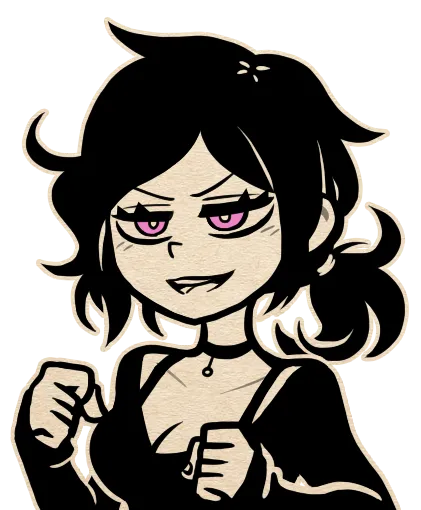
She’s excited, are you?
It’s All About Ashley
It really is, isn’t it? I mean, for approximately eighty percent of the total game as currently released and the entirety of Episode 1, you’re in control of Ashley, just as she’s in control of her and Andrew’s relationship for 80% of the game, up until the various ending sequences where it begins to slip. The only other characters who really matter at all in and of themselves are Andrew and her mother — and the former is under her thumb, and she eats the latter. It’s all about Ashley. Even her obsession with Andrew is, ultimately, about Ashley.
But who is Ashley? What is Ashley? Why is Ashley, even? Let’s take a look.
Ashley as presented to us in Episode 1 is very straightforward, so let’s list off the traits we’re given — she is malicious, she is fearless, she lacks empathy, she doesn’t have anything resembling a conscience, she demands Andrew belong to her and her alone, she has him at her beck and call.
In Episode 2, we’re ostensibly shown how she has him at her beck and call— she leverages the threat of reporting Nina’s death over him and had him swear to be with her forever. We’re shown that even as a child she was “just, like that” — but as a child, she hadn’t learnt to live with it yet, to laugh at the farce of it all.
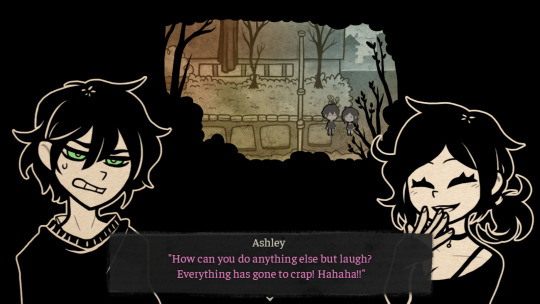
Yeah, exactly like that!
And she does this throughout Episode 1 — The Coffin of Andy and Leyley is a remarkably silly game much of the time, finding moments of absurdity and levity against a backdrop blacker than pitch — and most of the time, your internal narration is coming from Ashley and the jokes will not-infrequently come at her own expense.
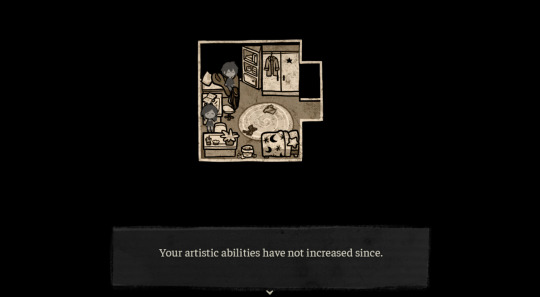
She will later get negged by her human sacrifice for her poor ritual circle drawing
Her reaction to being told that her soul is as dark and viscous as tar is “You guess you already knew that” — it’s confirmation to her, not new information. Ashley knows who she is. But who taught her this? There’s layers to this, nothing in this game is as simple and straightforward as it appears at first sight, which is why I’ve been obsessing over it for days.
While it’s common in fiction, the truth of the matter is, most ‘bad people’ really do think they’re good people. But Ashley has never once thought of herself as a good person — or perhaps better put as a person worthy of love — as we learn across Episodes 1 & 2, with our flashbacks to Andy and Leyley and the VERY VERY QUIET!!!

I really wish I had space in this essay to talk about this, but I’d like to touch on these being traits usually more easily forgiven in young boys than young girls at some point.
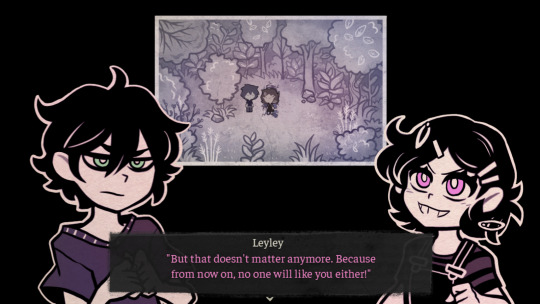
If she removes all other options, only then can she expect him to like her.
This is something that is echoed in the modern day — her seeming self-assurance is easily shaken and she reaches out to the world — usually Andrew — to affirm and validate her, soothing her insecurities, using any tool she deems necessary. Even when her life is on the line when Andrew has her by the throat at the climax of Episode 1, the only ‘compelling reason’ she can give Andrew to not kill her is her ability to soothe his nightmares. When he tells her there are sleeping pills for that…
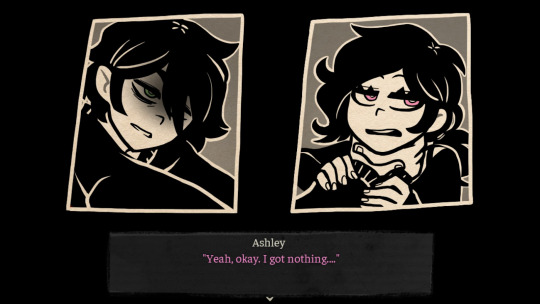
Most people would have a bit more to argue for their existence.
While she, unlike Andrew, acknowledges having had friends before the quarantine… you know she’s got a point that they didn’t even bother to answer her calls, that was clearly not something the state was interfering with given Andrew’s calls with his mother and his girlfriend, and given her general demeanour it’s not hard to imagine that… they weren’t ever very close. When we see her and Nina talk in the infamous ‘box scene’, it’s clear that Nina doesn’t like her very much, despite Andrew’s assessment of Nina as being one of Ashley’s friends.
We see further support for her general lack of companionship in her dream sequence in the Burial route — Leyley and Leyley Alone. No matter what you do, you can’t place the pink plushy at the family table, the flowers won’t bloom if you give the Julia and Nina plushies her own as a companion instead of Andrew’s — and if you’re bold enough to go for the ‘incest route’, in the ‘Love’ room you see that no one ever looks happy to be with her in the childlike depictions of her history, nor is she happy in turn, save for when she’s with Andrew. In a bit of heavy-handed metaphor, the player then overwrites all of these tense, upset, hard moments with Andrew, having him fill in for everyone else in life — and happy with her.
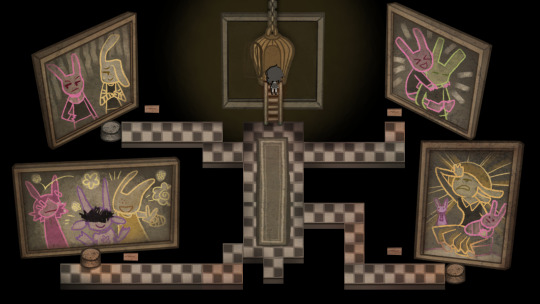
Once Upon A Lousy Life…
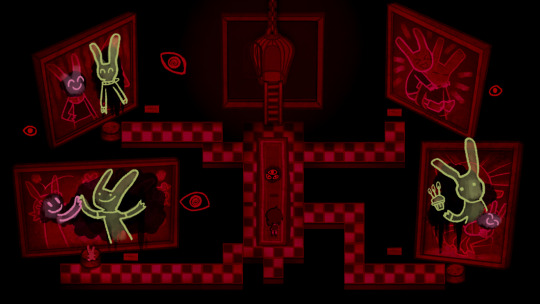
THE END
And that’s why she needs him to affirm her, because no one else ever has and no one else ever will. It’s even included in their comic beats — when the siblings are getting along well, they’ll often play a game where Andrew dramatically overpraises Ashley while she demands more; it’s a comedic bit but I mean — it really does matter to her!
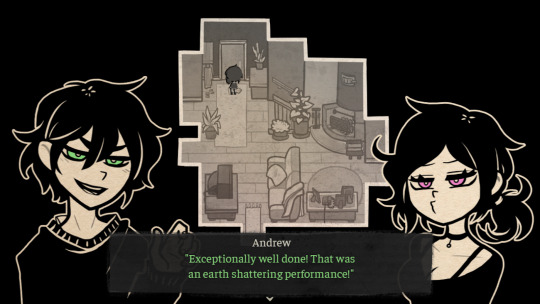
For the record, she opened a door. She gets a little heart in a speech bubble after this exchange.
We have a great example of this dynamic, that of insecurity and affirmation, in Episode 1, after Andrew has killed for her, butchered for her, his girlfriend broke up with her, he’s seemingly thrown his entire life away for her… she’s still insecure over her relationship with him, she’s uncertain of her control and she needs him to reaffirm it for her.
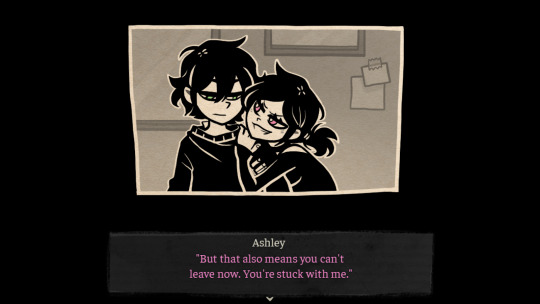
This is her victory, surely?
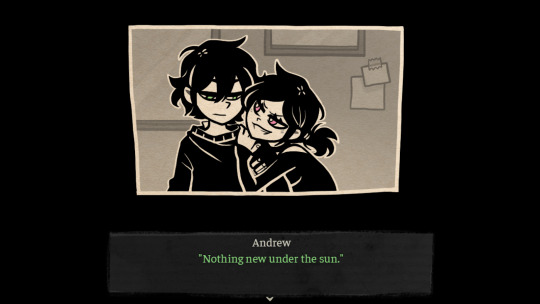
Andrew affirms her once, with his usual dead-eyed look.
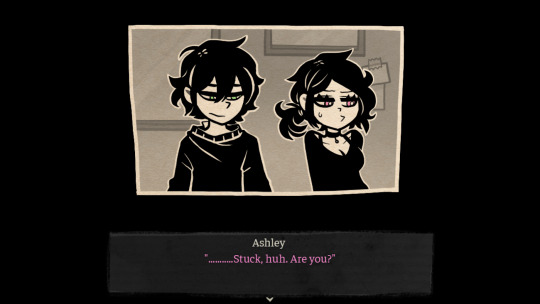
But she's still not so sure.
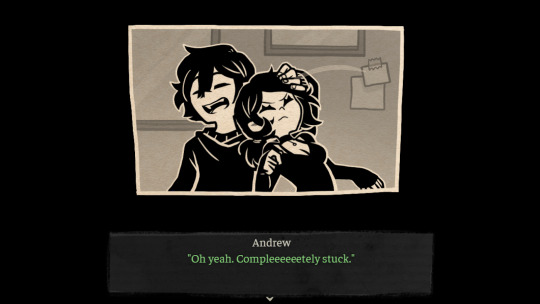
He actively reaches out to affirm her again with cheer.
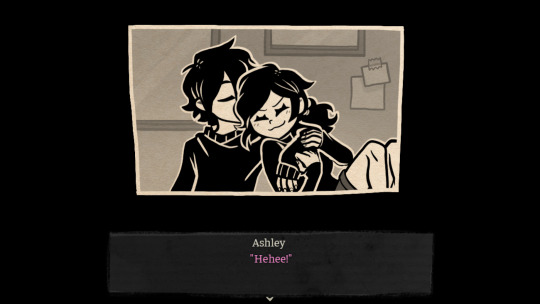
Look how happy she is!
While it’s most obvious and clear cut here, it’s hardly the only case. Let’s look back to the aftermath of Andy and Leyley and the VERY VERY QUIET!!! (I’m not using the other name). Leyley is, after similarly extreme acts — he murdered a girl and hid her body for her — convinced Andy doesn’t like her and she needs this leverage to keep him around, to meet her basic needs for survival. Because that’s what this is — she receives no care of affection elsewhere, so she forces it out of the only source she sees available through the means she sees as necessary.
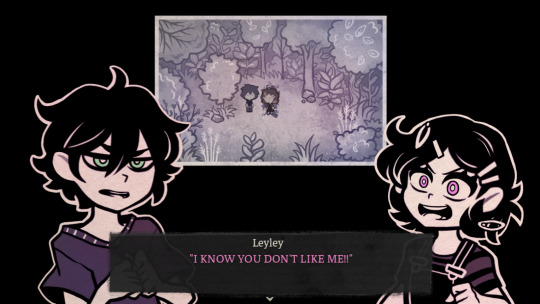
I really hope we see some of their earlier childhood in Episode 3
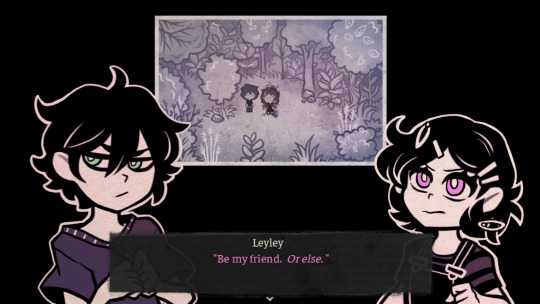
What exactly made her like this? Was it just neglect, or something more specific…
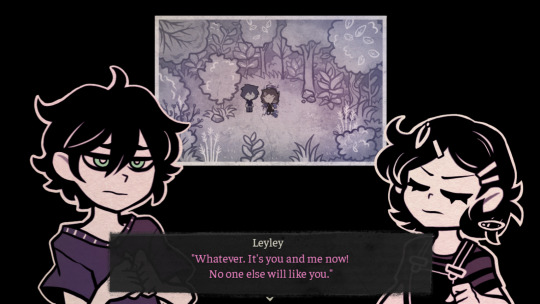
She needs this to be the case because otherwise she doesn’t believe he’d stay.
This pattern repeats throughout — Ashley’s insecurities are hit on and she reaches out to Andy to affirm that she is not alone, and she will use any and every tool to exploit her ostensible control over him and force him to be what she needs him to be — and as long as she has that, as long as she is everything to him and it’s not possible for him to leave, she’s happy. As long as she thinks he loves her in her very particular, very peculiar view of love, she’s content, come what may. As long as Andy and Leyley are together, they can take on the world.
Let’s talk about that view of love, because there’s always more layers to unpack here I’m only scratching the surface with this essay — Ashley consistently refers to anyone else Andrew may have befriended or spent time with as a whore, a slut, a bitch — highly gendered insults that bring to mind the idea that he’s cheating in some way. But it’s not even about sex — when Andrew mentions that their parents had friends, she accuses them of cheating on each other in the same way!
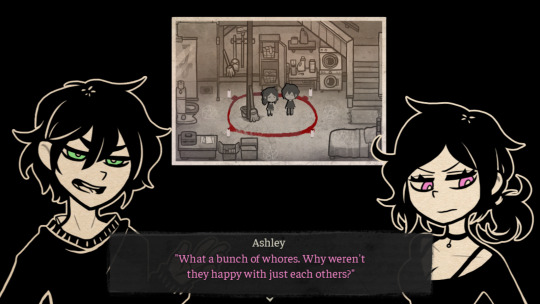
There’s a lot to unpack about Ashley’s view of femininity and the role the patriarchy plays in their relationship.
Any kind of emotional engagement, any kind of commitment, any kind of life outside of your significant other is, to Ashley, cheating. Because that’s what she needs from Andrew, a seeming complete and total commitment, secure in her place as the only thing in his life, because she cannot understand anyone picking her if they have a choice.
This insecurity she has in her relationship is what drives her to empower the trinket — he can’t leave her as long as she can protect him with prophetic dreams, after all. She needs every kind of leverage she can get because until she succeeds in being everything to him, in devouring him so completely she has him in her thrall mind, body and soul she can’t be sure of herself — hell, her dream sequence in Burial has you placing Andrew’s signature green plushy, ‘the best thing in the world’ in a cage far away from anything else.
Ultimately, it really is all about Ashley — even her seeming obsession with Andrew ultimately comes back to her own insecurities. If she is everything to ‘the best thing in the world’, some of that ‘best’ must surely reflect on her!
But that’s enough about the more normal, straightforward and understandable sibling.
That was not a joke.
Andrew’s Rank 100 Deception
The greatest trick the Devil ever pulled was convincing the world that he did not exist.
Let me explain.
You might have noticed that in the previous section I often use language such as ‘ostensibly’ or ‘seemingly’ to describe Andy and Leyley’s relationship, and there’s a good reason for that. From the beginning of the game through to its end, Andrew is lying to you, the player, without ever falsely representing or misinforming you about events that occurred.
The common, or obvious ‘initial take’ on Andrew as presented in Episode 1 is fairly straightforward. The game primes you to think this way, it frames things and strings reveals just right so as to make it very easy to overlook the incongruities it introduces in Episode 2. He’s a victim. Plain and simple, Ashley is his abuser and he is her victim and would be fine, a normal albeit kinda depressed guy without her.

It really is not a difficult conclusion to draw
You can go all the way through the game, have him try to accept his mother’s olive branch and enter the Decay route as a method for him to finally actualise his desire to get out from Ashley’s thumb and it makes sense, it’s a reasonable way for the story to go, given his character.
You see him this way because the game primes you in Episode 1 to view their relationship like Andrew does — he’s lying. He’s lying to himself, he’s lying to Ashley and he’s so good at it — Deception Rank 100 — he even lies to you. Without misrepresenting a single event or otherwise misleading you directly, the game gets you to buy into his preferred self-perception. Nina? Ashley. Julia? Ashley. The murders they commit in the course of the game? Ashley, Ashley, Ashley, it’s not his fault he’s not to blame he’s just a doormat at the beck and call of his demonic sister.
But he wants to be there. From the very outset, the very first puzzle, that’s made clear. Does anyone else remember this exchange, from right at the beginning of the game?

Ashley wants to investigate the music!
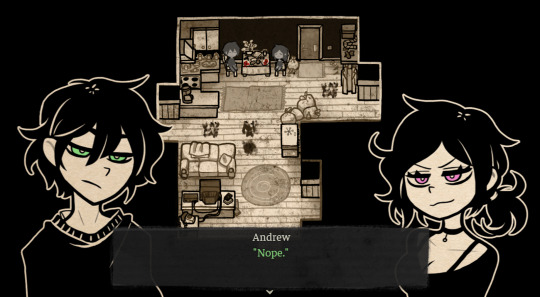
Andrew disapproves…
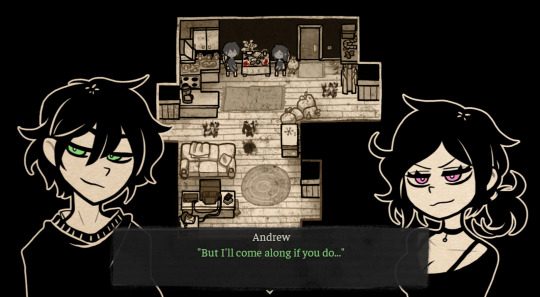
…Or does he?!
Like. Listen. Okay. You do not frown when saying ‘Nope’ and then smile when saying that you’ll instead tag along if they do it if your heart is at all in the no. That’s not an objection, that’s using Ashley as his excuse. Especially if you immediately throw her the balcony key that she could not possibly have gotten from you by force (more on Andrew’s ability to use force later).
This is the very first time you control both characters together with Andrew following Ashley instead of off on his own, the first adventure, the first puzzle!
But put a pin in that for now, let’s talk about his initial framing in Episode 2 first. Episode 1 has set us up to, generally speaking, believe the superficial framing of the siblings as portrayed in its promotional art:

The question that we then ask, right at the heart of it is… why is he a doormat? We explore this in his dream sequence in Episode 2, which does make it clear that the boy’s not okay but— it’s real easy, given the priming from Episode 1 to make you think that he’s the one with the originally functional moral compass, to think that that him being fucked up is damage done to him by Nina’s death and being bound to Ashley for his entire life. She corrupted him.
But, well, is that the case?
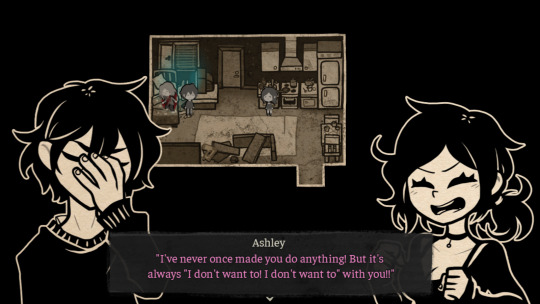
You're primed to ignore this as manipulation (which it is) but the best manipulation has some truth to it.
Precisely two things spur Andrew to action in the entire game, consistently — they are the fear of consequences and Ashley. And the first incident of that fear, the very first time we’re shown his seeming moral compass as a kid — the first time it’s really hammered home that it’s a fear of consequences rather than any true moral qualms is after Nina’s death. And why does he fear consequences here?
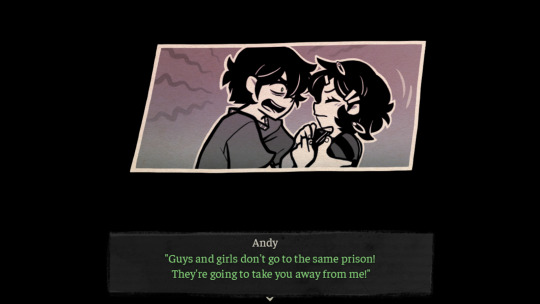
……
The ‘natural’ read that many take away from this sequence, particularly those who have only played Decay, is that Ashley browbeat him into doing this against his will, using emotional blackmail to overwhelm his objections, and then used the event itself to bind him to her forever as her personal doormat.
In a strict sense, this is true. But this doesn’t match up with the details, something the game uses shock to encourage you to overlook. That outburst is before any kind of threat has been made, and absolutely nothing either of them say anything about it being morally bad until Ashley weaponises ‘you’re a bad person’ against Andrew — morality didn’t seem to enter his mind or the equation at all until Ashley brought it up. More than that, his greatest fear and driving motivation even prior to that is, as shown above, being taken away from Ashley.
She, of course, recognises this and uses it against him. But she never needed to, it didn’t change anything about Andrew’s attachment to her, it was there to address her own insecurities.

Just like to touch on how a lot of his affirmations are preceded by him confirming her insecurities.
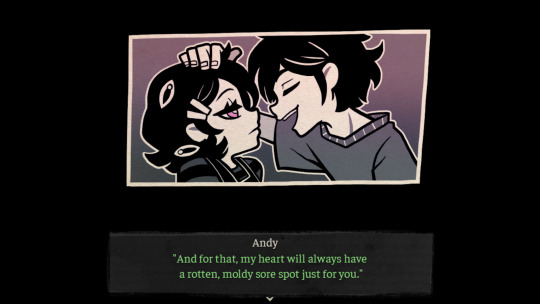
I adore this phrasing
There’s a second prong to this as well, to the question of ‘who really calls the shots here’ because — Andrew can, at any stage, apply an ‘ultimate veto’ of physical violence. The game is very clear to the player that that is on the table — even when they were children, when Andy swears their blood oath, he briefly considers killing her — and take note of how he ultimately got a ‘winning’ condition out of her by not specifying there wouldn’t be others and she is forced to accept that, there. Even outside of their most serious confrontations, Ashley is portrayed as having to convince, manipulate or otherwise coerce Andrew into going along with her schemes — she really can’t make him do anything, she doesn’t have the supremacy in violence and, to a lesser extent, capability that would allow her to.
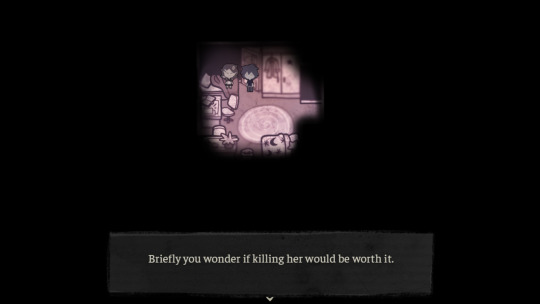
Andrew, you are like ten years old.
The truth of the matter is, Ashley can only make Andrew do anything because he lets her. I don’t mean in the sense that I’m saying abuse victims let their abusers emotionally abuse them, I mean in the sense that he is clearly considering his options on the table and choosing to discard those that could stop her, or bring an end to any of this. He needs her.
But it’s true that he hates her, too. He has to hate her, because if he doesn’t hate her, if he isn’t forced to have done this, that means… he’s responsible. And nothing, at the start of the story, is as important to Andrew as avoiding the consequences of his own actions, not even Ashley. By the midpoint, he loves her, he hates her, he can’t live without her, he wants to kill her — by the end… well, that depends if you’re on Decay or Burial, but more on that in a bit.
A great scene to study for this dynamic is the climax of Episode 1, when Andrew grabs Ashley by the throat and considers strangling her to death. She’s pushed him too far with hurtful words and assault, and he’s seemingly had enough.
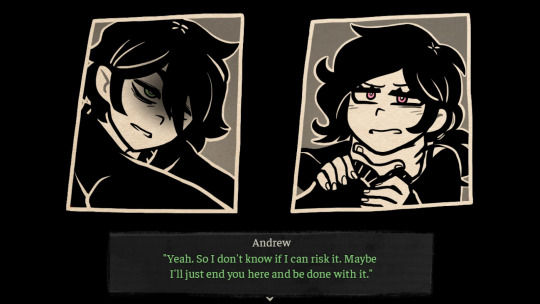
It’s still framed as a question of risk, of consequences happening to him.
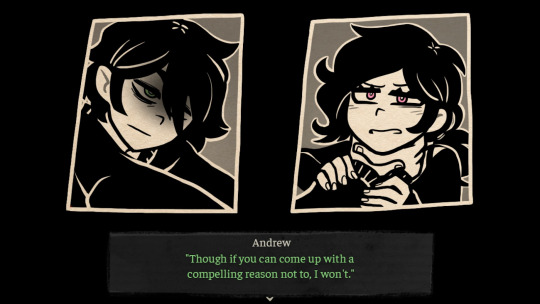
Like, this is not the usual behaviour of someone who’s been pushed past their breaking point.
He tells Ashley that he wants to kill her, because she’s just going to throw another fit and that’s a risk to him. She is… not framed as being able to fight back (she does have a gun here, and more on that in a later essay, maybe). He’s so calculated in how he approaches his use of violence here, which isn’t at all what you’d expect of someone about to commit a crime of passion… but it’s very easy to overlook because of the abuser/victim narrative that the player fits his behaviour into the narrative that the game primes them to accept, brushing incongruities under the carpet.
At the start of Episode 2, we get to control Andrew for the first time, and the first obvious holes in his cover start to show. Some of this is optional — you only learn that he’s been faking having nightmares in order to share a bed with Ashley if you choose to go back into the motel room and check the bed, for example — but not all of it.
----
#Talks with Toxic#the coffin of andy and leyley#tcoaal#analysis#andrew graves#ashley graves#character analysis#dynamic analysis
2K notes
·
View notes
Text
TEFUGEN: Redefining Engineering Excellence through Finite Element Analysis

WHY USE FEA IN YOUR ENGINEERING PROJECTS?
At the forefront of engineering excellence, TEFUGEN offers exceptional Finite Element Analysis (FEA) services in India. Utilizing FEA yields unparalleled benefits, offering profound insights into your project's performance prior to physical model construction. It aids in pinpointing stress points, identifying potential weaknesses, and assessing material durability under diverse conditions, effectively mitigating the risk of failure and associated costs. With its ability to conduct precise simulations, FEA empowers informed decision-making in design modifications, guaranteeing optimal performance and safety.
Structural Integrity Assessment:
In engineering, FEA, an indispensable method, meticulously assesses structural integrity by simulating material responses to diverse conditions. This predictive analysis is pivotal for guaranteeing the safety and reliability of designs. TEFUGEN, as a FEA consulting service in India, provides expert assistance, enabling engineers to identify potential weaknesses and optimize for durability.
Thermal stress analysis:
FEA analysis services play a key role in assessing heat distribution within structures or components. Engineers leverage this analysis to model and analyze thermal behavior meticulously. By doing so, they optimize designs for efficient heat dissipation or retention, ensuring the performance and reliability of the system. This detailed analysis enables engineers to make informed decisions regarding material selection, insulation, or heat management strategies, ultimately enhancing overall system efficiency and longevity.
Mechanical Component Design:
FE Analysis plays a crucial role in optimizing mechanical component design by accurately predicting stress, strain, and deformation. This ensures components can effectively withstand operational loads while minimizing material usage, thereby enhancing efficiency and cost-effectiveness.
Fatigue Analysis:
Engineers use FEA for fatigue analysis, predicting the lifespan of components subjected to cyclic loading. This is crucial in industries like aerospace and automotive, where understanding material fatigue is paramount.
Fluid Structure Interaction:
Fluid Structure Interaction (FSI) is a crucial aspect of FE Analysis, examining the dynamic interaction between fluids and structures. By simulating how fluids affect nearby structures and vice versa, FSI enables engineers to optimize designs for enhanced performance and durability across various industries.
Modal analysis Modal analysis using FEA techniques enables the simulation of eigenfrequencies and eigenmodes, revealing the vibrational characteristics of a structure. Meanwhile, harmonic analysis facilitates the emulation of peak responses to specific loads, offering insights into system behavior. These analyses are indispensable tools for understanding structural dynamics and optimizing performance.
Motion study Unlocking insights into structural behavior through Finite Element Analysis (FEA) motion studies. Discover the intricate dynamics of systems, optimize designs, and ensure structural resilience with FEA motion analysis.
#Finite Element Analysis Consulting Services in India#FEA Analysis Services#FEA Consulting Engineers#FEA Consultants in Trichy#FEA#Finite Element Method#Structural Analysis#Stress Analysis#Static Analysis#Dynamic Analysis#Thermal Analysis#Fluid Flow Analysis#Vibration Analysis#Fatigue Analysis#Buckling Analysis#Modal Analysis#Meshing#Boundary Conditions#Material Properties#Convergence#Post-processing#Optimisation#Mesh Generation#Simulation Software
0 notes
Text
When Bruce said he was proud of Jason for stepping away from guns, Jason immediately clarified that he wasn't doing it for him.
When Dick said he was proud of Jason for stepping away from guns, Jason didn't feel the need to clarify this.
Interesting contrast I noticed.
#dc comics#dc#comics#comic books#batman urban legends#red hood cheer#nightwing comics#nightwing 2016#nightwing fear state#nightwing annual#batfam#batfamily#batkids#character dynamics#jason and bruce#jason and dick#jason todd#red hood#the red hood#character analysis#comic analysis#media analysis#bruce wayne#batman#dick grayson#nightwing#batman comics#red hood comics#parallels#parallelism
6K notes
·
View notes
Text
Hookfang being so careful with everyone other than Snotlout is so important. He’s a beast of a dragon, he literally goes into fights blazing without a plan. He respects strength first.
Most humans are delicate little things that he has to handle with the kiddy gloves on. He’s cautious with the twins, gentle with Hiccup, respectful with Astrid, careful with Fishlegs.
Snotlout however is his viking and he’s a good one. Made of tougher stuff or whatever. He can handle a little roughhousing. He can handle Hookfang catching fire every once in a while, he can handle being scooped and thrown and shaken, he can handle a chomp or two. More than “handle” honestly, he likes it, because he’s the same genre of feral-for-action.
We know Snotlout does, but the fact Hookfang also sees them as equals (despite all their fighting) is very dear to me
#hookfang#snotlout jorgenson#snotfang#<- platonic#httyd#httyd rob#httyd rtte#analysis#dragon & rider dynamics
2K notes
·
View notes
Text
i have suddenly become obsessed with a theme that HoO established but never proceeded to extrapolate on, which is:
You are Percy Jackson, and you have been swapped with a boy who was allegedly everyone's favorite person, but they have decided to replace him with you. They just met you. You stand next to his best friend and the people he's known his entire life. In his home. In his cloak. In his place. They stopped looking for him.
You are Jason Grace, and you have just found out you have a long lost sister who completely replaced you in her life with this girl you just met. Your lives and personalities are mirrors. She is you, living the life you were robbed of.
You are Annabeth Chase, and you have just become starkly aware that you have been inhabiting the void left behind by your best friend's long lost brother. You and Luke were just replacements for him. Now you have to look him in the eyes when he has nothing and know you took that life from him.
You are Piper McLean, and you have just found out your relationship is fake and built entirely on the memories of Annabeth Chase. You have been given a boyfriend when hers has been taken away. You have no idea how much of it is real or not but regardless you feel like if your relationship isn't exactly in their image that you have failed.
You are Leo Valdez, and you have just learned that you are the echo of your great-grandfather. You are not your own person. You just exist to be a mirror of him. A doppelganger. An actor and stunt double facing all the danger he never had to but wearing his face. To be there for his best friend decades later simply because he couldn't. You are playing a role. A seventh wheel and a pawn for a goddess who carefully sculpted your entire life for her own purposes.
You are Hazel Levesque, and the only reason you are alive is because your brother couldn't save your his sister. You are a consolation prize. An apology. Your existence here is misplaced in every way but you inhabit it anyways.
You are Frank Zhang, and you are a shapeshifter. Inhabiting your own body feels strange and clumsy when you could be literally anything at any time. You are anything and everything and live your life with the simple certainty of knowing exactly how you will die.
#pjo#hoo#heroes of olympus#percy jackson#riordanverse#jason grace#annabeth chase#piper mclean#leo valdez#hazel levesque#frank zhang#meta#analysis#me shaking hoo: what if we actually address the interpersonal dynamics of the characters. please. please. please. please.#frank is the only person on the boat not having an identity crisis tied to another member of the crew somehow and that is FASCINATING#but also WHERE is all the interpersonal literally anything. hello. please. making grabby hands. everybody identity crisis go.#i wanna see the entire argo ii crew stumbling through trying to figure out their places and senses of self!!!!!#particularly in relation to each other!!!!! we get snippets but we rarely ever get the full thing or a resolution!!!#like. HELLO??? Piper acknowledging that her relationship with Jason is artificially sculpted in the image of Annabeth and Percy???#and that her ideals of what Jason and her can be are just that she feels like they need to be like what Percy and Annabeth have????#and thats just DROPPED COMPLETELY????#poor Jason is getting replaced twice. Leo is not his own person.#Hazel at least gets the resolution that Nico does not truly see her as a consolation prize#but Annabeth gets to be hit with the like EIGHT YEAR DELAY of learning the place she inhabits in Thalia's life is the echo of someone else#cause like. yeah she knew Thalia had lost her brother but i dont think it clicked for her until she met Jason that oh. she *replaced* him#Frank at least has some certainty about his identity in one aspect (his curse). everybody else is floundering a bit#except for maybe Percy but its kind of the camps of ''i replaced this person and it weighs on me'' versus ''i have been replaced''
3K notes
·
View notes
Text
Machine Foundation: Types, Suitability, and Design Criteria
Introduction Machine foundation are the unsung heroes of industrial operations, providing the essential support needed for the seamless functioning of heavy machinery. A well-designed foundation not only bears the weight of the machine but also acts as a barrier against vibrations that could otherwise compromise structural integrity. In this comprehensive guide, we will explore the various types…

View On WordPress
#Block Type#Box Type#Compressors#Dynamic Analysis#Frame Type#Machine Foundation#Pumps#Reciprocating Machine#Rotating Machine#Small Rotating Machines#Soil#Vibratory Machines#wall Type
0 notes
Note
What's Hiro and Takato's relationship like?
Okay, that's an interesting question. So let's start by discussing their personality.
First of all, Hiro is not Takato's expy. Takato and Hiro (and Haru) do go against the "brash shonen hero" common archetype, being significantly more mild-mannered. Because of that, Haru and Hiro are often considered to be a spiritual rehashing of Takato, and many have tried to make close parallels between the two, but while the desire to make comparison is naturally understandable, the truth is that the two characters actually have many differences. So, that makes the relationship between them more dynamic than you think.
In terms of general personality, Takato and Hiro are half introverts and half extroverts. They are not particularly withdrawn or overly active. However, Takato is cheerful, carefree, emotional, and imaginative, which is suitable because he is ten years old. About Hiro, he is calmer, dependable, and more introspective. Said of that, both can be childish: Takato, especially, is not much altruistic. He is not the kind of naturally selfless person who puts others before themselves without a second thought.
As much as Takato is a “soft” person, he’s not necessarily very “kind” or “nice”, especially during the early parts of the series; he can get possessive or clingy, petty, or even a little arrogant (Tamers episode 11 basically has him go on a mini-power trip based on his card combo having worked so well in the prior episode, which ends up becoming part of his isolation from Hirokazu and Kenta in the following one). Moreover, Takato loses his emotional composure and becomes a crying mess as early as Tamers episode 2, and while it’s not like other normal characters hadn’t been prone to emotional outbursts, combine it with the above facts and you get the take-home that Takato isn’t “soft” out of an active choice to be so much as he’s just really, really lacking in emotional mettle to begin with.
Hiro's calmness is not merely innate. Due to his upbringing, while he is energetic and caring of others, he tends to suppress his childlike side. Being alone in his life, his behavior is different from Takato's: it's more independent and careful. This is NOT the criticism for Takato; it's just a fact because Hiro is older than Takato and has a very different context to begin with.
A similar point between Takato and Hiro is that having to deal with a Digimon partner that’s outright troublesome at times and doesn’t have a fully intelligent understanding of how to communicate is a pretty rough thing to start off with. Yet they still care about their partners: with Takato, that's because Guilmon is his designed creator, all what he wants to have aside to be a hero; with Hiro, Gammamon makes him feel that he has a family. So, you can see their relationships with their partners are quite the same.
Some people decide to read Hiro as a flat character, with which I don't agree. A character is not "flat" just because they don't have a clear character development. With Takato, his character arc involves having to understand what a hero like one on the TV show is like and actually grow into someone worthy of the position of a "protagonist." Ghost Game is not really having a clear plotline (which is not that conventional; the early part of Adventure is not really having a smooth plotline), so that makes Hiro's story more about understanding his partner, his group, and Digimon and trying to help them.
A difference between the two is their behaviors: Takato is highly emotive and lacks emotional mettle, while Hiro is dependable and calmer. They are both caring and sensitive, but Takato is more true to his feelings, and Hiro is more reserved. In Japanese, Takato uses "boku" (deferential/polite, because although he is not specifically "nice" or "kind", he usually can't be impulsive, so Takato is "soft"). Despite Hiro's chiller and reserved personality, he is less deferential, as he still uses the assertive "ore" as his first-person pronoun. Both are just trying to keep a polite sense of distance. You can say that they are both a bit aloof.
How about their core motivations? Takato is more driven by personal connections (friends, family, Guilmon). This is not surprising, because he is not very altruistic and is still a kid who just wants to have a partner to play with. Hiro is driven by a sense of responsibility and care for Gammamon; he deals with Digimon because he is responsible and cares for others.
So what do their personalities affect in their dynamic/relationship? Like I had told you, the two have different features in their personality and also have a three-year-old distinct. Hiro, being older and naturally dependable, would view Takato as someone to guide and protect, almost like a younger brother. Takato, on the other hand, would admire Hiro’s calm and composed demeanor, aspiring to emulate some of his traits while maintaining his imaginative and emotive core. This creates a dynamic where Hiro acts as a stabilizing presence, while Takato is more openly expressive and heartfelt.
Hiro’s inclination to suppress his childlike side due to his upbringing contrasts with Takato’s cheerfulness and emotional openness. This difference could lead to moments where Takato encourages him to embrace his emotions more freely. Conversely, Hiro’s steady nature would reassure Takato in moments of self-doubt or emotional overwhelm, helping him to stay grounded.
Their conversations would likely reflect their emotional closeness despite their differences. Hiro’s tone would be gentle yet firm, guiding Takato with a big-brother-like patience, while Takato’s dialogue would be more comfortable and happy, bringing a sense of warmth and sincerity to their interactions. In terms of actions, they are not too active, but Hiro will be behind, trying to understand others' logic, and Takato will be the kind, natural boy we know. Their emotional connection would be one of mutual respect and growing understanding. Hiro would recognize Takato’s sensitivity as a strength, while Takato would appreciate the quiet care Hiro puts into his actions.
On a subtler level, their body language would also reflect their dynamic. Hiro’s posture would be more composed, his gestures measured, often placing a reassuring hand on Takato’s shoulder or guiding him with a nod. Takato, being more emotive, might bounce slightly on his feet when excited. Eye contact between them would communicate their understanding, with Hiro’s steady gaze offering reassurance and Takato’s wide-eyed expression conveying trust and admiration.
Personally, I think their relationship will be very interesting. Sadly, there's no such canon ones in any media. But we can hope, can't we? If you notice any mistake or unclear part in my analysis, please tell me! Sometimes writing about the relationship between two strange characters can become quite cliché. Have a good day~
#digimon#digimon tamers#digimon ghost game#matsuda Takato#amanokawa hiro#headcanon#imagine#meta#analysis#relationship analysis#character dynamics#dynamic analysis
3 notes
·
View notes
Text
I came across this screenshot of a YouTube comment about Pride and Prejudice on Pinterest ↓
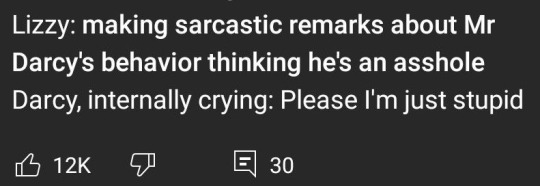
Ordinarily, I don't go out of my way to pour scorn on other people's interpretations, and certainly not without good reason. But this one really, really irked me.
I don't know what's more depressing; that someone interpreted Mr Darcy and Elizabeth's dynamic in this way, or that 12,000 people apparently agreed...
...because there are two major problems with this interpretation:
Firstly, Darcy is an asshole.
Secondly, he's very much not a stupid man.
This isn't just my opinion. This is canon.
Elizabeth doesn't think Mr Darcy is a terrible person because she happened to feel like it one day. Darcy gave her every reason to think he had absolutely no redeeming features. I mean, their very first interaction, before (contrary to what adaptations portray) they had even said a single word to each other, was when he insulted her.
Not only that, Darcy knew what he was doing, as this excerpt from chapter 3 proves:
'Turning round [Darcy] looked for a moment at Elizabeth, till catching her eye, he withdrew his own and coldly said: “She is tolerable, but not handsome enough to tempt me; I am in no humour at present to give consequence to young ladies who are slighted by other men. You had better return to your partner and enjoy her smiles, for you are wasting your time with me.'
Darcy wanted Elizabeth to hear him. There is no mistaking that. Yes, Elizabeth should have listened to the repeated warnings she received from others that Wickham was not all he seemed and that, perhaps, Darcy wasn't so bad... but you can completely understand why she was prejudiced against him. I wouldn't forgive someone saying something like that about me in a hurry.
There are other examples of Darcy's rudeness to Elizabeth. His tone of voice is described as 'grave' and 'cold' when they dance at the Netherfield ball in chapter 18; when he visits Hunsford Parsonage in chapter 32, he ends their exchange in a rude manner '[Darcy] experienced some change of feeling; he drew back his chair, took a newspaper from the table, and glancing over it, said, in a colder voice: “Are you pleased with Kent?”' and there are too many examples in the proposal in chapter 34, but for me the worst is, 'towards him I have been kinder than towards myself.'
If a man implied that separating my beloved sister from the man who loved her, was kinder to them both than the agony of him proposing to me... well, I don't think he would've walked away from that exchange. Elizabeth Bennet you are a better person than me.
Regarding the other point: Darcy's intelligence is never questioned. In fact, the narrator devotes time to ensuring we understand that in chapter 4:
'In understanding, Darcy was the superior. Bingley was by no means deficient, but Darcy was clever. He was at the same time haughty, reserved, and fastidious, and his manners, though well-bred, were not inviting.'
Again, this man knew exactly what he was doing. He wasn't sorry about any of it, and he certainly was not 'internally crying.' Mr Darcy was a conceited, spoiled rich man who needed to be made aware of his flaws and reflect on them in order to become a better person; or at least, improve enough that he ceased to give the impression that he was not, at his core, a compassionate man with many great qualities.
At the same time, Elizabeth was not a poor, innocent angel who was slighted by a man and who subsequently never did anything wrong. She didn't deserve to be on the receiving end of Darcy's unpleasantness, no; but she, too, was absolutely blind to her own flaws... until she read Darcy's letter.
I just think that if you don't grasp this fundamental aspect of their respective personalities and subsequent interactions, then how can the payoff possibly be satisfying?
Pride and Prejudice is, amongst many other things, a story about two flawed people whose love for the other shapes them into the best possible versions of themselves. It's really beautiful and it's a shame to think such a key part of it is being misinterpreted.
#pride and prejudice#mr darcy#elizabeth bennet#fitzwilliam darcy#jane austen#classic lit#text#cora rants#my analysis#i will never say someone is wrong in their opinion even if i disagree because that's not my style and if you're brave enough to share#your thoughts online then that deserves some respect but this.. .man .... I CAANTTTTTTT#stop watering them down!!!! their dynamic means so much to meeeeeee i hate to see it misunderstood#let darcy be flawed you cowards
664 notes
·
View notes
Text
and what if i said nicky is actually really important to neil’s development as a character and also to neil as a person? are we ready for that conversation
#the thing about nicky is that he feels incredibly grounded in a way the others don’t necessarily#his issues largely go back to his fucked up family dynamics#and his flaws also generally seem to be reactions against the atmosphere he grew up in#ie he pushes people to be open about their sexuality because he never could be#& the whole eden’s scene shows his lack of respecting/understanding boundaries in the worst way#and it’s familiar to us as readers—nicky could be someone anyone knows#and that makes his flaws harder for readers to move past than like. murder.#or things that aren’t part of daily life#BUT#none of that changes the fact that nicky hemmick is so so important to neil#he gets multiple of neil’s rare smiles#he’s the one that tells neil the foxes are his friends#he accepts him as family and pushes him to find meaning outside of exy#neil doesn’t fully trust him after eden’s#but he also doesn’t really fully trust anyone except MAYBE andrew and wymack#anyway#more nuanced analysis of nicky plz#and also appreciation#hbd nicholas hemmick ily#aftg#all for the game#nicky hemmick
436 notes
·
View notes